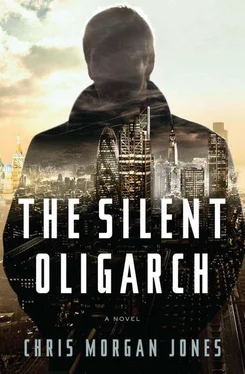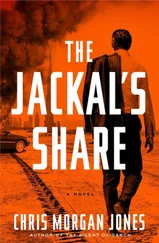Chris Morgan Jones
THE SILENT OLIGARCH
High in the air Webster watches the unbroken desert flow past, a deep copper red in the dawn, the sand ridged like waves rolling down toward the south. Next to him Inessa lies curled up, sleeping through the jolts of turbulence and the drunken songs of the Russian engineers across the aisle.
Below, the sand gives way to grass on the vast Kazakh plain and in the distance, if he presses his face to the window, he can see the Altai mountains rising and stretching east into China. He glances across at Inessa; she’s small enough to be comfortable in her rigid seat, her knees pulled up against her chest like a child. It’s rare to see her be still, rare for her to be silent.
She opens her eyes for a moment, moves a lock of black hair off her forehead and goes back to sleep. Webster tries to rearrange his aching legs against the seat in front. Five hours overnight from Moscow. He wouldn’t suffer this for anyone else.
OSKEMEN IS KAZAKH NOW but shows its Russian past: wide highways lined with thickly planted poplars, tall Soviet blocks on scrappy ground, grand imperial buildings and gold-domed churches. The city is hot under the hazy sun and the wind blows powerfully from the plain, bending trees into the road.
The plant is sixty miles away, across a low mountain range. As Webster drives, Inessa rails against its owners, a group of Russians who pilfer from their workers, steal from the government and seem happy for everything they own to slowly die. He has heard this before, has read her articles, but listens again willingly.
Coming down from the mountains on a twisting road they see a band of heavy gray cloud hanging in the broad valley where the plant stands. The grass at the side of the road is yellow and sparse; young trees, recently planted along the verge, sag limply against their supports; the fields all around lie untilled. The air, fresher in the mountains, has become warm and thick. A mile or two ahead, over the meager, low town, black smoke leaks from a dozen pairs of chimneys.
The town is a barracks for the plant. Twenty thousand people live in the uniform apartment blocks, buy food at the two supermarkets, learn at the three schools. There is a street of shops, a police station, a dusty park.
At the hospital they talk to doctors who treat brittle bones and pneumonia, to children who never smile and hide their teeth as they talk, to workers in their thirties who have the bodies of old men. No crops grow in the valley. Over decades waste has been dumped in an unlined pit and chemicals have seeped unchecked into the water table. The new owners arrived five years before and nothing has been done.
No one from the company will talk to them and they stand for a while in the heat, arguing to no purpose with a guard sitting in his hut by the gates. Behind him the plant seems to bully the town. Twelve immense, blockish halls hold the furnaces, and from each one chimneys rise a hundred feet in red and white stripes. Webster takes photographs, trying to capture its immensity; it would take a quarter of an hour to walk to the compound’s farthest point. Two police officers arrive, sweating in their peaked caps and military uniforms, and move them on. Inessa resists but it’s clear they should go. They have enough.
The sun is low in the sky, setting early behind the black ridge of mountains, and it’s dark by the time they reach Oskemen. At dinner Inessa is more furious than he has ever seen her. She makes him promise that they will fight this injustice, the betrayal of these people.
WEBSTER SLEEPS RESTLESSLY in the hotel’s hard, clean bed. An hour before dawn, half-conscious, he hears a key turning in the lock and as he pulls back his covers the door opens, the fluorescent light flickering on. Two policemen in uniform walk into the room, pushing aside a member of the hotel staff. One stands over Webster so that his cap blocks out the light and tells him in calm, even Russian to stay in bed; the other searches the room, opening drawers, emptying a bag onto the floor. Webster, squinting, tries to stand up, but the first policeman stops him. His colleague tears the film from Webster’s camera in three long pulls and starts leafing through his notes.
Webster makes a grab for his book but is pushed backward onto the bed. As the policemen shut the door behind them they tell him to leave the country on the first flight out.
His camera sits on the chest of drawers, its hinged back open, and scattered over the thin hotel carpet lie yesterday’s clothes.
He runs to the floor above, bounding up the tiled steps three at a time in his bare feet. He wants to share his rage. Inessa’s door is open, and with a bolt of fear in his chest he looks inside. She’s gone.
THE NIGHT MANAGER is in his office, sitting in an armchair watching television, the sound down low. His forehead is pinched in a frown, and when Webster asks him where the police station is he won’t meet his eye.
He runs the whole way, the two bags on his back swinging wildly, his lungs tight and his breath beginning to rasp. It is six now, and an even gray-blue light is waking the city. Cars pass but he sees no one. At the front desk, out of breath and angry, he tells an officer that he is a journalist and if they don’t release his friend now he will call the British embassy and every newspaper editor he knows. The officer looks at him indifferently for a moment, goes to fetch a colleague, and they arrest him.
His cell has gray painted walls, no window, and two bare wooden boards for beds; he’s lucky to have it to himself. With his head in his hands he sits under the single, bare bulb, its light finding every stain and crack in the damp concrete floor. This isn’t the first time he has been in such a place, and for Inessa this is routine; but a strange fear sits in his chest and he wants to see her, to reassure her that they will soon be released. The silence is broken by occasional noise: a scream, wild singing, a metal door slamming shut. To pass the time he smokes and begins to write his story in his head.
No one comes to question him, and he wonders how long this will take. Toward the middle of the day he hears the cell doors opening in turn and readies himself for something to happen, but it’s only a guard bringing food. As he pokes at his tray he hears voices shouting over each other in Kazakh, commands being yelled and heavy boots running past. The commotion doesn’t stop. His door opens again and two policemen lead him away, one on each arm, refusing to answer his questions. As they step into the corridor he turns his head and sees three officers standing by the open door of a cell. One of them, his broad chest a patchwork of medals, stands back with his arms folded. There is a stretcher at his feet.
Webster wrenches an arm free and shouts Inessa’s name, feeling dread in his throat. As they take hold of him again and march him away he rages and shouts, twisting and straining, but they drag him on, his feet stumbling on the floor. Then a shout like a crack echoes off the walls and the men holding him stop and turn. The officer with the medals beckons once. Slowly they walk Webster back down the corridor until he is level with the cell.
Inside two officers hold a prisoner to the wall, his face pressed against it, his arm twisted up behind his back. He wears a white shirt, filthy and splashed with red. On the floor lies Inessa, on her back, one knee up, gazing at the wall. Her jeans are soaked and dark, her T-shirt crimson. Her neck is taut, and streaked across it, as if drawn with a thick brush, is a single vivid line of blood.
Webster shouts and tries to break free. Strong hands hold him back.
Читать дальше












